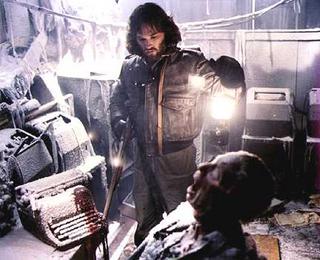
In one of my countless guilty pleasures (and if you have enough of them, they stop either making you feel guilty or being pleasurable), The Thing (1982), Kurt Russell's R.J. MacReady reminds everyone that "Trust is a tough thing to come by these days." This makes sense at the time, considering they're trapped in the Arctic outpost John W. Campbell first brought to light in the short story, "Who Goes There?" way back in 1938, at the dawn of print SF's Golden Age. The outpost is under siege--or more correctly, being literally infiltrated--by a shape-shifting alien. Of course, John Carpenter's movie was preceded by The Thing from Another World in 1951--at another dawn, that of film SF's First Wave--directed by Christian Nyby with Howard Hawks as producer (Yeah, just like the way Tobe Hooper directed under Steven Spielberg in Poltergeist, a movie that looks a lot more like E.T. than The Texas Chainsaw Massacre). Carpenter's version is truer to Campbell's story's central idea, although it's soaked in pre-CGI gross-out FX; but what I remember most--after the severed head that sprouts spiderlegs and tries to scramble away--is Kurt Russell's Mac, in a performance I am proudly ashamed to love, as I do too many of Russell's performances. A friend of mine thinks much of the appeal is in Mac's hat, which is a Yosemite Sam affair, floppy, be-tasselled--and worn by Russell with complete conviction. I even ran across an internet review with the tagline, "Kurt Russell and His Hat Burn Some Aliens Dead." Every time I see The Thing I want the hat, even though I know I couldn't wear it like Russell did. (Note: Try as I might, I couldn't find an image online of Russell with said chapeau. Darn.)
To be fair, not every Kurt Russell performance is a guilty pleasure. From Elvis (1979) to Silkwood (1983), from Tequila Sunrise (1988) to Tombstone (1993), from Breakdown (1997) to the remarkable Dark Blue (2002), Russell has proven himself able to pull off a down-to-the-bone movie star trick: He is versatile while always seeming himself. Like Robert Mitchum or Burt Lancaster or Kathleen Turner, you can always see Russell coming, even when he's wearing one heckuva weird hat.
OK, so back to the concept of The Hat, the guilty foolish thing Russell so often is, in Big Trouble in Little China (1986) and the two Escape from ... movies--and much of it with John Carpenter, another guilty party(-er)--not to mention Soldier (1998) and his big breakaway--after Elvis--from all those 1960s Disney movies, Used Cars (1980), an early Robert Zemeckis movie whose cheerful cynicism introduced me to the notion that one can never trust anyone who smokes Mores. And for me that is the joy of a Russell guilty pleasure: the gleeful loss of trust in him, either to play it straight or camp it up. The Thing is perhaps the best display of this; I am never sure if Russell thinks he's in a horror film or a comedy. I think John Carpenter is the co-conspirator here. His movies with Russell are impishly perverse, imbued with '70s paranoia and a ruthlessness that careens with go-kart abandon. Unlike a movie such as Overboard (1987), in which one feels no uncertainty concerning his intents: you can tell he's relishing the opportunity to play it broadly, to toss lines and fellow actors around like corks on the bounding main. And, in a different vein, in Soldier he plays it fearsomely straight, while also managing to make his silent, genetically souped-up super-soldier of the future an almost poignant figure. This has its precedents; I've always insisted that until Richard Crenna shows up in First Blood (1982) to explain to everyone that John Rambo is screwed up and will kill everybody, Stallone gives Rambo a mute anguish--no, I really mean it--that tells us he is alone and unable to stop himself, as sad as George and Martha in Who's Afraid of Virginia Woolfe? (1966), and almost as dangerous. Russell channels that in Soldier; just check out the look in his eyes. He seems lost, almost frightened, even on the verge of tears. It is a tightly wound performance that, I must admit, does fit the straight-faced silliness of the material, nicely illustrating, like First Blood, the fine line between pathos and bathos; but Russell adds touches the movie doesn't need, but profits from, little things with his eyes, the corners of his mouth, a slight tilt of the head; and in a small way he puts his finger on the fatal adolescent urges of the American action hero, and asks us to worry about him, despite the biceps and ultra-cool kill techniques.
I guess in the end I must admit that Kurt Russell is a guilty pleasure because I do trust him: not to be too complex an actor, but still smart enough to wink at the camera without making us feel like suckers; and to draw us with that hangdog look into movies that don't quite deserve our trust, even though he does.
2 comments:
I think that Kurt Russell is a brilliant actor. When studying his tacitcs, realism and restraint within certain movies such as Overboard, soldier and Breakdown it can be clearly seen, that he uses various techniques in order to position audiendces to accept a certain point of view.
Anonymous--
I agree. Russell does ask us to "accept a certain point of view"--and I think especially in the more "outlandish" movies such as the ones you mention, where the movie falls apart if we do not accept the world we're given. Russell acts as our bridge between the implausible/outrageous/silly elements of the movie and our need to understand and recognize the character at the center of those goings-on. I just saw "Breakdown" again last week, and was reminded of how ridiculous the situation is, but how believable he was in it--which allowed us to suspend disbelief and accept the film on its terms.
Post a Comment